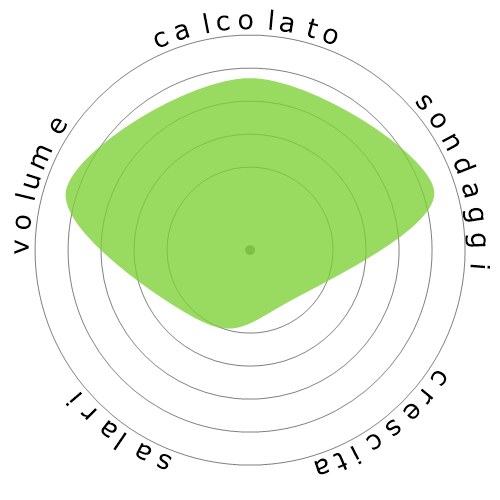Infermiere Professionale Autorizzato e Infermiere Vocazionale Autorizzato
Dove Vorresti Andare Prossimamente?
Oppure, esplora questa professione in maggiore dettaglio...


Cosa mostra questo fiocco di neve?
Cos'è questo?
Valutiamo i lavori utilizzando quattro fattori. Questi sono:
- Possibilità di essere automatizzati
- Crescita del lavoro
- Salari
- Volume di posizioni disponibili
Questi sono alcuni aspetti chiave da considerare quando si cerca un lavoro.
Le persone hanno anche visualizzato
Rischio di automazione calcolato
Rischio Basso (21-40%): Lavori a questo livello hanno un rischio limitato di automazione, in quanto richiedono un mix di competenze tecniche e centrato sull'uomo.
Ulteriori informazioni su cosa sia questo punteggio e su come viene calcolato sono disponibili qui.
Sondaggio degli utenti
I nostri visitatori hanno votato che c'è una bassa probabilità che questa professione sarà automatizzata. Questa valutazione è ulteriormente supportata dal livello di rischio di automazione calcolato, che stima una possibilità di automazione del 24%.
Cosa pensi sia il rischio dell'automazione?
Qual è la probabilità che Infermiere Professionale Autorizzato e Infermiere Vocazionale Autorizzato venga sostituito da robot o intelligenza artificiale nei prossimi 20 anni?
Crescita
Il numero di offerte di lavoro per 'Licensed Practical and Licensed Vocational Nurses' dovrebbe aumentare 2,6% entro il 2033
Occupazione totale e stime delle offerte di lavoro
Le previsioni aggiornate sono previste per 09-2025.
Salari
Nel 2023, il salario annuo mediano per 'Licensed Practical and Licensed Vocational Nurses' era di 59.730 $, o 29 $ all'ora.
'Licensed Practical and Licensed Vocational Nurses' hanno ricevuto un salario 24,3% superiore al salario mediano nazionale, che si attestava a 48.060 $
Salari nel tempo
Volume
A partire dal 2023 c'erano 630.250 persone impiegate come 'Licensed Practical and Licensed Vocational Nurses' negli Stati Uniti.
Questo rappresenta circa il 0,42% della forza lavoro impiegata in tutto il paese
In altre parole, circa 1 su 240 persone sono impiegate come 'Licensed Practical and Licensed Vocational Nurses'.
Descrizione del lavoro
Assistenza per pazienti malati, feriti, in convalescenza o persone con disabilità in ospedali, case di cura, cliniche, case private, case di gruppo e istituzioni simili. Potrebbe lavorare sotto la supervisione di un'infermiera registrata. È richiesta la licenza.
SOC Code: 29-2061.00
Commenti (2)
As an example, take the humanised skill of empathy. Empathy is the emotional skill to understand and share the feelings of another person. This shared emotional connection is something many, if not all, patients crave and desire. Empathy is something that AI cannot replicate well. In order for empathy to occur between two individuals, both individuals must be capable of emotions. Humans are capable of emotions, but AI robots are not. Emotions are biological, chemical, and mental reactions to certain stimuli. These reactions are uniquely inherent to organic living biological beings. An AI robot is not an organic living being, and thus cannot produce emotions. The best an AI can do is be programmed in a way to say certain things when a patient exhibits particular facial responses or verbal/tonal nuances. However, there is more to empathy than just being responsive. There exists a shared feeling that a human can only feel with another human, or another animal, especially when one of those humans is in a medically ill or injurious state.
Critical thinking serves as another example of a humanised skill that AI will find difficult to replicate. Critical thinking is the intellectual act of considering certain concepts, and constructing a charitable and objective take on said concepts through abstract reasoning or empirical evidence. To further this, the more unique and nuanced those concepts are, the more difficult it will be to critically think about said concepts. In the healthcare settings that LVNs find themselves in, there exists many unique concepts, or in this case, situations. I will illuminate one and that would be the case of patients with severe dementia. Patients with this mental condition may showcase behaviour that includes, but not limited to, loud screaming, random crying and potential desires for killing. What to do with these kind of patients is something LVNs face on a daily basis. Should the LVN just ignore the patient? Doing so may endanger the patient to him or herself, or worse, endanger other patients situated in the same room. Ignoring patients is also considered abuse in healthcare settings. On the other hand, ignoring the patient may allow the LVN to give care to other patients with much more debilitating conditions in the meantime, and thus allowing the LVN efficient time management. The LVN can also attend to that patient first, but only to administer medication that will calm him down, and make the LVN’s work less difficult. This may prove detrimental, if a family member of another patient asked the LVN to administer medicine to him first, because he missed a dose earlier in the day. With all this in mind, one can see how as an LVN there are many factors that they have to consider when making a reasonable decision, such as proper ethics, personal feelings, logical order of work, and so on. The LVN must be able to evaluate these factors and utilise his intellectual capacity for reason to support making the right decision. An AI’s intellectual capacity is much more rigid than a human’s mind. An AI robot cannot improvise at any given moment in the same fashion as a human. Unique situations, such as the aforementioned dementia case, requires a mind being able to asses many nuanced factors unique to the situation. Unfortunately, AI is just not capable yet of such critical thinking.
Rispondi al commento